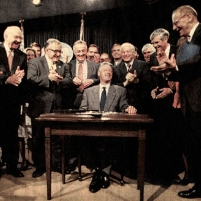Financial Reform Lite: No Glass-Steagall This Time Around
Friday, May 28, 2010
 Democrats and Republicans rejoice as President Bill Clinton signs repeal of Glass-Steagall Act
Democrats and Republicans rejoice as President Bill Clinton signs repeal of Glass-Steagall Act
If it becomes law, the financial reform legislation in Congress will impose a number of significant changes affecting how Wall Street operates. It would establish a new agency to oversee consumer financial products, create a council to monitor systemic risk and step up regulation of derivatives, mortgage brokers, credit-rating companies and hedge funds, according to Bloomberg News.
But no one will confuse the reform bill with the landmark legislation that lawmakers embraced during President Franklin Roosevelt’s first term. Known as the Glass-Steagall Act, the 1933 measure set about to keep banks from becoming too large—and too dangerous—for the financial system and the economy to handle. It split up financial institutions, forcing bankers to choose between running a commercial or investment enterprise, but not both. Glass-Steagall prevented banks from gambling with depositors’ money.
Banks operated under the Glass-Steagall rules until 1999, when a Republican Congress and Democratic President Bill Clinton joined together to repeal what one historian, Charles Geisst, called the “most effective antitrust law we’ve ever had.” With the restrictions gone, Citicorp and Travelers Group were able to merger, forming Citigroup; Bank of America was able to acquire Merrill Lynch; and Goldman Sachs and Morgan Stanley were able to convert to bank holding companies, giving them access to cheap funding from the Federal Reserve during the financial crisis. Within nine years of the repeal of Glass-Steagall, the economy all but collapsed.
The current reform plan makes no effort to force banks once again to separate their commercial operations from investment ones. That means institutions “too big to fail” will continue to dominate Wall Street, and possibly bleed the U.S. Treasury again if another crisis threatens to bring them down, like in 2008.
-Noel Brinkerhoff
Wall Street Rules May Fall Short of Glass-Steagall (by Robert Schmidt and Jesse Westbrook, Bloomberg News)
10-Year Anniversary of the Bill That Led to the Current Economic Crisis (by Noel Brinkerhoff and David Wallechinsky, AllGov)
- Top Stories
- Unusual News
- Where is the Money Going?
- Controversies
- U.S. and the World
- Appointments and Resignations
- Latest News
- Trump to Stop Deportations If…
- Trump Denounces World Series
- What If China Invaded the United States?
- Donald Trump Has a Mental Health Problem and It Has a Name
- Trump Goes on Renaming Frenzy






Comments